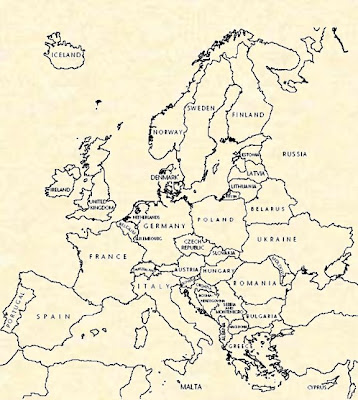Om even door te gaan, goedmenende Paul Goossens: schrijf niet gelijk wát, lees af en toe ook iets !
.
 Dat de begrippen Europa en Christendom verstrengeld zijn is een historisch feit dat zelfs de briljantste sofist niet ongedaan kan maken […] Maar evengoed is het zo dat er in de Europese cultuur ook niet-christelijke strengen aanwezig zijn; de Romeinse, Helleense, je kunt zelfs volhouden Perzische, en (voor de moderne eeuwen) Joodse. Of er ook een moslimse streng bestaat is al moeilijker te zeggen.
Dat de begrippen Europa en Christendom verstrengeld zijn is een historisch feit dat zelfs de briljantste sofist niet ongedaan kan maken […] Maar evengoed is het zo dat er in de Europese cultuur ook niet-christelijke strengen aanwezig zijn; de Romeinse, Helleense, je kunt zelfs volhouden Perzische, en (voor de moderne eeuwen) Joodse. Of er ook een moslimse streng bestaat is al moeilijker te zeggen.[De Europese cultuur] is geen speelbal van het kapitalisme of het socialisme; het is geen monopoliebezit van EEG-eurocraten of van wie dan ook. Er zich toe bekennen, is niet hetzelfde als superioriteit over andere culturen claimen […] Het geheel van de Europese cultuur is enkel het eindproduct van 3000 jaar werk van onze voorouders. Het is een erfenis die wij op eigen risico kunnen versmaden, maar het zou misdadig zijn de jongere en toekomende generaties er verstoken van te laten. Veeleer is het onze taak haar te bewaren en te verjongen.
The interweaving of the notions of Europe and of Christendom is a fact of History which even the most brilliant sophistry cannot undo […] But it is no less true that there are strands in European culture that are not Christian; the Roman, the Hellenic, arguably the Persian, and (in modern centuries) the Jewish. Whether there is also a Muslim strand is more difficult to say.
[European culture] is not an instrument of capitalism or socialism; it is not a monopoly possession of EEC Eurocrats or of anyone else. To owe allegiance to it, is not to claim superiority over other cultures […] The unity of European culture is simply the end-product of 3000 years of labour by our ancestors. It is the heritage which we spurn at our peril, and of which it would be a crime to deprive younger and future generations. Rather it is our task to preserve and renew it.
Hugh Seton-Watson
“What Is Europe, Where Is Europe? From Mystique to Politique”
11th Martin Wright Lecture, delivered at the Royal Institute of International Affairs
Encounter 65/2 (July-Aug. 1985), pp. 9-17
“What Is Europe, Where Is Europe? From Mystique to Politique”
11th Martin Wright Lecture, delivered at the Royal Institute of International Affairs
Encounter 65/2 (July-Aug. 1985), pp. 9-17
.
Luc Ferry dacht daar nog anders over, de arme drommel.




Geen opmerkingen:
Een reactie posten